
A teacher, also called a schoolteacher or formally an educator, is a person who helps students to acquire knowledge, competence or virtue.
Special education is the practice of educating students in a way that accommodates their individual differences, disabilities, and special needs. This involves the individually planned and systematically monitored arrangement of teaching procedures, adapted equipment and materials, and accessible settings. These interventions are designed to help individuals with special needs achieve a higher level of personal self-sufficiency and success in school and in their community, which may not be available if the student were only given access to a typical classroom education.

Experiential education is a philosophy of education that describes the process that occurs between a teacher and student that infuses direct experience with the learning environment and content. The term is not interchangeable with experiential learning; however experiential learning is a sub-field and operates under the methodologies of experiential education. The Association for Experiential Education regards experiential education as "a philosophy that informs many methodologies in which educators purposefully engage with learners in direct experience and focused reflection in order to increase knowledge, develop skills, clarify values, and develop people's capacity to contribute to their communities". Experiential education is the term for the philosophy and educational progressivism is the movement which it informed.
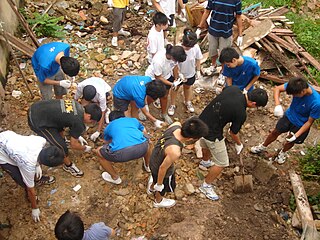
Service-learning is an educational approach that combines learning objectives with community service in order to provide a pragmatic, progressive learning experience while meeting societal needs.

Community service is unpaid work performed by a person or group of people for the benefit and betterment of their community without any form of compensation. Community service can be distinct from volunteering, since it is not always performed on a voluntary basis and may be compulsory. Although personal benefits may be realized, it may be performed for a variety of reasons including citizenship requirements, a substitution of criminal justice sanctions, requirements of a school or class, and requisites for the receipt of certain benefits.
Gang Resistance Education And Training, abbreviated G.R.E.A.T., provides a school-based, police officer instructed program that includes classroom instruction and various learning activities. Their intention is to teach the students to avoid gangs as well as drugs and alcohol.

Singapore American School (SAS) is a non-profit, independent, co-educational day school located in the Woodlands area of Singapore. It offers an American-based curriculum for students in preschool through high school. One of Singapore's first international schools, SAS was founded in 1956 and started with a hundred students in a colonial house. It has since developed into a school of over 4,000 students on a 36-acre campus. SAS is accredited by the US-based Western Association of Schools and Colleges (WASC).
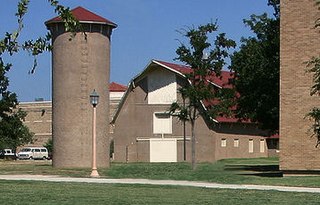
Agricultural education is the teaching of agriculture, natural resources, and land management. At higher levels, agricultural education is primarily undertaken to prepare students for employment in the agricultural sector. Classes taught in an agricultural education curriculum may include horticulture, land management, turf grass management, agricultural science, small animal care, machine and shop classes, health and nutrition, livestock management, and biology.
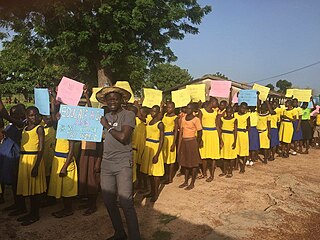
Inclusion in education refers to all students being able to access and gain equal opportunities to education and learning. It arose in the context of special education with an individualized education program or 504 plan, and is built on the notion that it is more effective for students with special needs to have the said mixed experience for them to be more successful in social interactions leading to further success in life. The philosophy behind the implementation of the inclusion model does not prioritize, but still provides for the utilization of special classrooms and special schools for the education of students with disabilities. Inclusive education models are brought into force by educational administrators with the intention of moving away from seclusion models of special education to the fullest extent practical, the idea being that it is to the social benefit of general education students and special education students alike, with the more able students serving as peer models and those less able serving as motivation for general education students to learn empathy.

O'Neill Sea Odyssey is an American non-profit organization located in Santa Cruz, California. It was founded in 1996 by wetsuit innovator Jack O'Neill and provides students with hands-on lessons on marine habitat and the relationship between the oceans and the environment.
The Office of Distance Education (ODE) was founded in July 1998 on the campus of the Arkansas School for Mathematics, Sciences, and the Arts in Hot Springs, Arkansas and is now a part of the University of Arkansas System. Originally established in order to expand educational opportunities in Arkansas’ rural schools, the Office of Distance Education uses H.323-based video conferencing to provide highly qualified, fully certified teachers to school districts nationwide unable to hire qualified faculty locally.
A business–education partnership is an agreement of collaboration between schools and businesses, unions, governments or community organizations. These partnerships are established by agreement between two or more parties to establish goals, and to construct a plan of action for achievement of those goals.
The Close Up Foundation is a nonprofit, nonpartisan civic education organization in Washington, D.C. Established in 1971, Close Up offers programming to educate and encourage young people to participate in their civic affairs and government. About 850,000 students and teachers have participated in its programs.
The Edible Schoolyard (ESY) is a 1-acre (4,000 m2) garden and kitchen program at the Martin Luther King Jr. Middle School, a public middle school in Berkeley, California. The Edible Schoolyard was established in 1995 by chef and author Alice Waters and is supported by the Edible Schoolyard Project, a non-profit founded by Waters in 1995 in celebration of the 25th anniversary of her famed Berkeley, California restaurant, Chez Panisse.
HealthCorps is an American nonprofit organization that provides school-based and organizational health education and peer mentoring, in addition to community outreach to underserved populations. Its mission is to strengthen communities by highlighting innovative approaches to health and wellness to build resilience in America's youth. Students learn life-saving skills in nutrition, fitness and mental resilience as well as hands-on CPR training, organ donation and more.
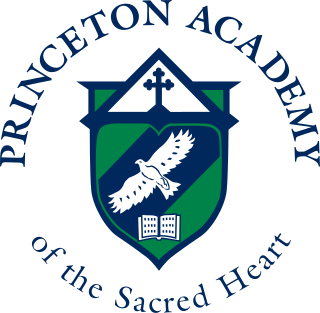
Princeton Academy of the Sacred Heart is an independent school for boys in Kindergarten through Grade 8. Located in Princeton, New Jersey the school is part of the Network of Sacred Heart Schools.
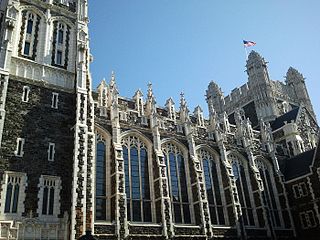
Colin Powell School for Civic and Global Leadership at the City College of New York (CCNY) is a nonpartisan educational, training, and research center named for its founder, General Colin L. Powell, USA (Retired), a graduate of CCNY. The goals of the Powell School are to build leaders for the common good, promote civic engagement, and strengthen connections between the campus and neighboring communities. The current dean is Andrew Rich.

Partners in Development Foundation (PIDF), an IRS Section 501(c)(3) non-profit public foundation, was incorporated in 1997 in Honolulu, Hawaiʻi. It has established and implemented programs in the areas of education, social services, Hawaiian culture, Hawaiian language, and preservation of the natural environment and traditional Hawaiian agriculture. These programs now have served close to ten thousand people in communities throughout Hawai‘i. In 2011, PIDF received grants of more than $1.6 million from the US Department of Education through the Native Hawaiian Education Act. The grants were awarded for the purpose of continuing, expanding, and improving the educational programs of PIDF.
Action civics is a modern and alternative form of civics education in the United States. Action civics is an applied civic education process in which participants learn about government by examining issues in their own community and then select a focus issue for action through a process of debate, research the issue and learn advocacy strategies, develop civic skills such as public speaking, formulate a plan, mobilize, educate, then evaluate, and reflect on their experience. Participants' voices are encouraged, valued and incorporated. Participants learn by doing, with a focus on collective action. Action civics can encompass a number of different actions from community service to electoral engagement and from talking about concerns with public officials to creating peer education campaigns.
The Rohr Jewish Learning Institute (JLI) is a division of Merkos L'Inyonei Chinuch, the educational arm of the Chabad-Lubavitch Orthodox Jewish Hasidic dynasty. It offers adult Jewish courses on Jewish history, law, ethics, philosophy and rabbinical literature worldwide. It also develops Jewish studies curricula specifically for women, college students, teenagers, and seniors.










